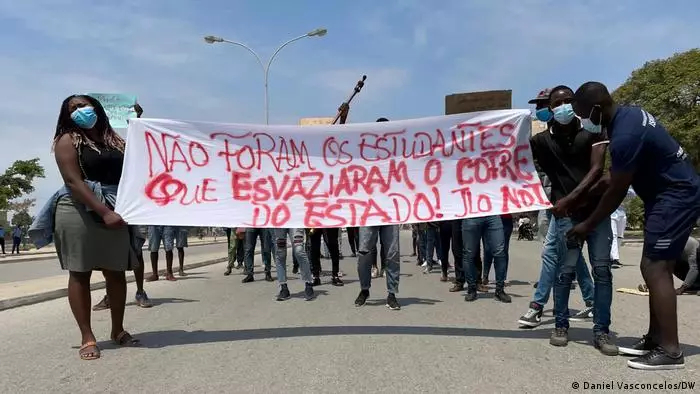We like to publish an inofficial translation of an article by the democratic newspaper A Nova Democracia that was sent to us.
Angola: Students protest against increase in electoral fund

Angolan students march in 2021. Photo: Daniel Vasconcelos/DW
Hundreds of students took to the streets of Angola's capital Luanda last week to protest against the increase in the electoral fund, now at 1.2 billion kwanzas (R$15.2 million) amid a serious crisis in the country. The students denounced that the billions were granted to electoral parties in the midst of a serious scrapping of education, which is not resolved under the justification of "lack of funds".
The students gathered with banners in a square in the capital to condemn the amount of 1.2 billion kwanzas for the election campaigns of the various election parties. It was denounced that while the politicians of the old Angolan state grant billions of kwanzas to themselves, schools suffer from a lack of desks and libraries. Teachers also complain of overcrowded classrooms and low salaries. Currently, the country's education budget is 6.5 percent, but the target for 2022 was 20 percent.
The increase in the electoral fund was granted after the "opposition" parties sent letters to the country's president, João Lourenço, demanding more money. This fact led the demonstrators to claim that while parliamentarians fight and mobilise to get more money for their reactionary parties, they do nothing to increase the money dedicated to the people.
João Lourenço and the electoral farce in Angola
Angola is currently governed by João Lourenço, a reactionary president affiliated to the opportunist Popular Movement for the Liberation of Angola (MPLA), an old national liberation movement which in the 1970s openly and shamefully betrayed the cause of the Angolan people, implementing a regime of oppression and exploitation in the interests of the landowners and big bourgeoisie, at the service of imperialism.
Although the MPLA has been in government since the return of bourgeois elections in Angola after the end of the country's civil war in 1992, the opportunist party - as well as the entire electoral farce - has less and less credibility from the popular masses, who are boycotting the country's electoral farce. In 2017, when João Lourenço was elected, around 43% of the Angolan people abstained from the elections.
Unsurprisingly, his government was marked by cases of corruption, subservience to imperialism, mainly Chinese, and several popular protests, against which João Lourenço moved the harshest repression. In January 2022, taxi drivers burned down MPLA committees in a righteous rebellion against the government's decision to reduce the crowding of transport, including taxis. The repressive forces of the old Angolan state arrested at least 33 protesters. Already in May, the Angolan National Police murdered three workers who took part in protests against the Chinese imperialist China Ghezouba Group Company Limited.
